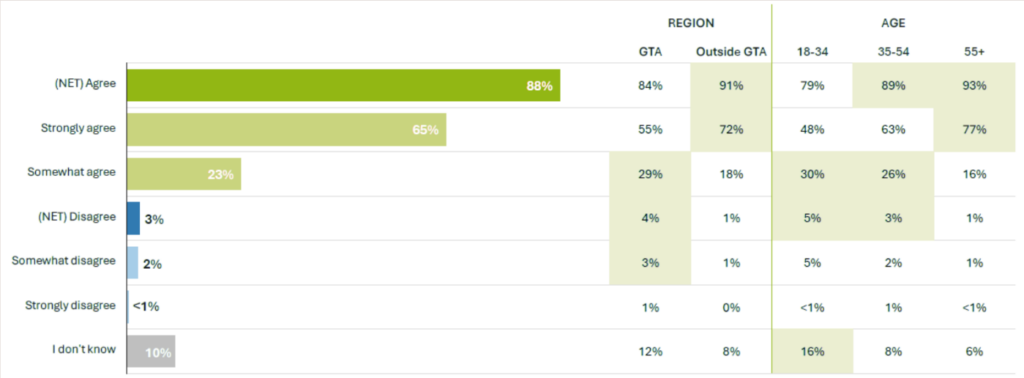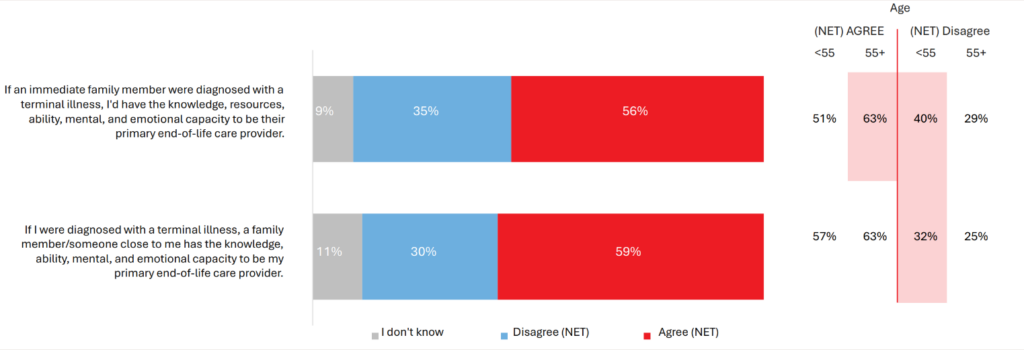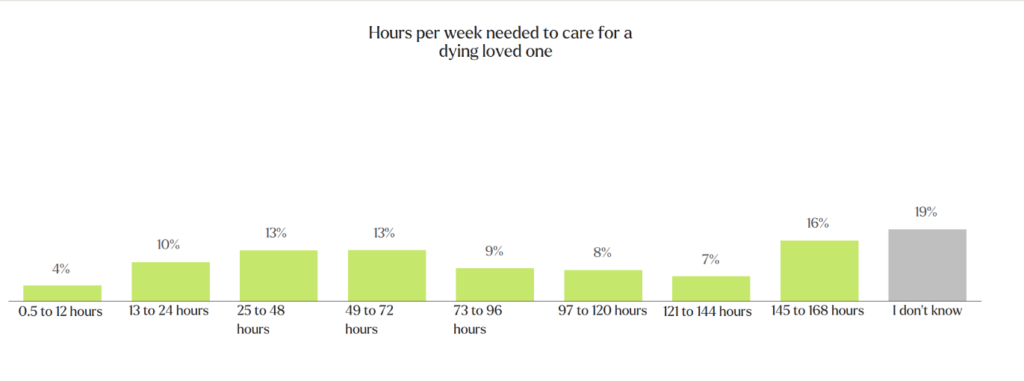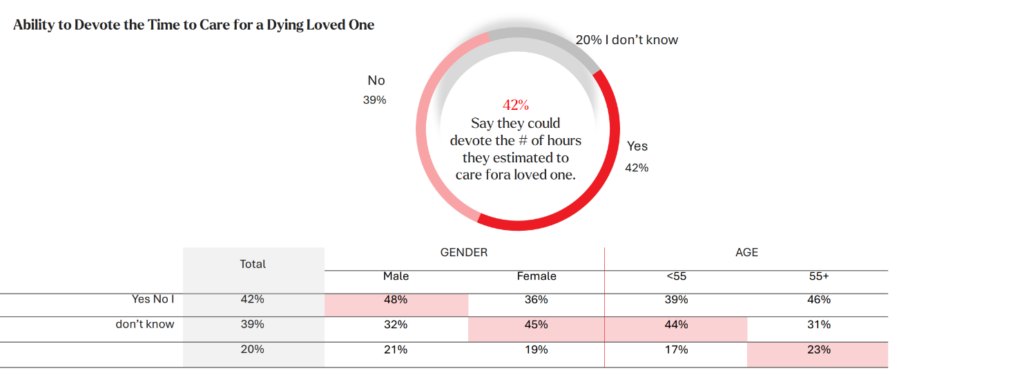Hospice Palliative Helpline: 905-667-1865
A recent province-wide Hospice Mississauga survey conducted by Leger in April 2025 revealed that 88 % of Ontarians believe hospice palliative care is an essential part of the healthcare continuum. Yet, despite this overwhelming support, the public still faces barriers to access and information.
Only 31% of respondents said they would turn to a local hospice centre when a family member is diagnosed with a terminal illness—most still rely on family doctors. This underscores the importance of raising awareness and improving communication and infrastructure so that connecting with one’s local hospice care provider becomes a first call, not a last resort.
Additionally, the demands placed on informal caregivers—usually family members—are staggering. Nearly half of Ontarians underestimate or are unsure of the 145+ hours per week often required to care for a dying loved one at home. While 56% feel equipped emotionally and mentally, only 42% believe they can devote the necessary time given their current schedules and commitments. These numbers reflect a harsh reality: people want to help, but they often can’t—logistically, emotionally, or physically.
As our neighbours and loved ones reach life’s final chapters, compassionate care and comfort should be available within the city they call home. With a growing need for end-of-life care and a new Hospice Centre underway, the time to act is now.
To meet this urgent need, Hospice Mississauga is building a 24/7 Hospice Centre at 2176 Speakman Drive. This state-of-the-art facility will feature 12 specialized care suites, each with its own patio, and will be staffed by nurses, palliative care physicians, personal support workers, and volunteers around the clock. The Centre will also house the Community Palliative Care Clinic, offering expanded access to existing services such as bereavement counselling, spiritual care, age-appropriate grief programs for children and youth (HUGG), and health and wellness initiatives.
All combined, this Centre will provide families with a peaceful, home-like setting where their loved ones can receive personalized end-of-life care and family members the care and bereavement support they need.
From kitchen tables to office boardrooms and local councillor, MP, and MPP offices, together we can ensure that well-funded, professional end-of-life care and wrap-around services are available to residents throughout Mississauga, where, and when, they need them.
Funding hospice care is not only an investment in infrastructure – it’s an investment in human connection, community resilience, and the kind of healthcare system we all hope will be there when we need it.
By supporting Hospice Mississauga, you’re not just funding care, you’re helping build a legacy of love, empathy, compassion and dignity for families. Let your support reflect the values that connect us all: Rooted in Care. Connected in Compassion.
The majority (88%) believe hospice palliative care is an essential part of the health care continuum.
In fact, nearly two-thirds of respondents (65%) say they strongly agree with this. Agreement is higher among those aged 35 and older, residents living outside the Greater Toronto Area, and individuals born in Canada (90% vs. 81% of those born outside Canada). Women (71%) are more likely than men (58%) to strongly agree.

While hospice palliative care is widely regarded as essential, most (71%) would turn to their primary physician if they needed guidance, and merely one third would turn to a local hospice centre.
Those most likely to turn to a local hospice centre include women, ages 55 and up, residents outside the GTA (37% vs. 24% in the GTA), and those born in Canada (33% vs. 23% of those born outside Canada).

Ontarians (aged 55+) are significantly more likely to feel equipped to provide end-of-life care for a loved one, while younger Ontarians (under 55) are more likely to feel unprepared.
Four-in-ten (40%) under 55 say they would not be ready to take on this role, compared to three-in-ten (29%) of those 55 and older. Similarly, 32% of Ontarians under 55 lack confidence that a loved one could provide end-of-life care to them if needed, compared to 25% of those 55 and older.

Ontarians are divided on how many hours caring for a dying loved one takes per week.
Women and ages 55+ (22% each) are nearly twice as likely as men (10%) and those under 55 (12%) to estimate a higher weekly caregiving demand of 145-168 hours. Meanwhile, two- in-ten (19%) are unsure of how many hours would be required.

While more than half (56%) feel they have the knowledge, resources, and ability to care for a dying loved one, fewer (42%) say they could devote the time based on their current schedule.
A similar proportion (39%) say they couldn’t, while two-in-ten remain unsure. While women and ages 55+ are more likely to think more hours are needed to care for a dying loved one, men are more likely to feel they could manage the time demands.

Source: April 4-7, 2025 Leger Omnibus Survey with n=1002 Ontarians aged 18+ +/- 3.1%
1-855 Matheson Blvd E, Mississauga, ON L4W 4L6 | (905) 712-8119 | info@hospicemississauga.ca
Charitable Registration Number: 132155011 RR 0001
Copyright © 2025 All Rights Reserved